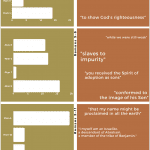I previously noted the pervasive presence of honor and shame in Romans. Sometimes, honor-shame language is overt. Strangely, scholars tend to neglect these ideas in their studies. Often, they only make a passing comment or two about honor or shame.

Granted, honor and shame are not densely concentrated into particular passages, as we see with faith, works, and justification. What we do see, however, is something just as substantial. Honor and shame permeate the entire letter. Many people do not realize that the potter-clay imagery has overt honor-shame connotations as well.
Moreover, notice what happens when you dig deeper to examine the Old Testament passages cited by Paul. Those Old Testament texts intertwine honor, shame, and other motifs found in Romans. As a result, they help us better connect the dots of Paul’s logic. Honor and shame provide another layer of background to help interpreters discern Paul’s train of thought.
(For a deep dive into this subject, check out chapter 10 of Reading Romans with Eastern Eyes: Honor and Shame in Paul’s Message and Mission.)
Striking Observations and Questions
I’ll mention a few noteworthy passages that I study in Reading Romans with Eastern Eyes. When we compare what Paul writes with the Old Testament context, several questions come to mind.
-
Romans 10:9-13 (Isaiah 28 and Joel 2)
Twice in 12 verses (Romans 9:33, 10:11), Paul draws from Isaiah 28:16 saying, “Everyone who believes in him will not be put to shame.” Why?
Romans 10:13 is famous: “Everyone who calls on the name of the Lord will be saved.” Many readers don’t realize the quote comes from Joel 2:32. Even fewer ask the question, “In Joel, people are saved from what?”
In back to back verses (Joel 2:26-27), the prophet says, “my people shall never again be put to shame.” Also interesting is Joel 2:23, which speaks of people’s vindication/righteousness (צְדָקָה (MT); δικαιοσύνη in LXX).
How can we ignore this?
-
Romans 8:33-34 (Isaiah 50)
Scholars well know that Paul quotes Isaiah 50:8 when he writes,
“Who shall bring any charge against God’s elect? It is God who justifies. Who is to condemn? Christ Jesus is the one who died—more than that, who was raised—who is at the right hand of God, who indeed is interceding for us.”
However, few people spend much time discussing the broader context. For example, Isaiah 50:6-7 says,
“I gave my back to those who strike, and my cheeks to those who pull out the beard; I hid not my face from disgrace and spitting. But the Lord God helps me; therefore I have not been disgraced; therefore I have set my face like a flint, and I know that I shall not be put to shame.”
A few verses earlier, in Isaiah 49:23, the prophet says
“Kings shall be your foster fathers, and their queens your nursing mothers. With their faces to the ground they shall bow down to you, and lick the dust of your feet. Then you will know that I am the Lord; those who wait for me shall not be put to shame.”
-
Romans 9:19-24 (Exodus 9; Isaiah 41, 45)
Debates about predestination routinely hijack our minds when reading the latter half of Romans 9.
19 You will say to me then, “Why does he still find fault? For who can resist his will?” 20 But who are you, O man, to answer back to God? Will what is molded say to its molder, “Why have you made me like this?” 21 Has the potter no right over the clay, to make out of the same lump one vessel for honorable use and another for dishonorable use?
22 What if God, desiring to show his wrath and to make known his power, has endured with much patience vessels of wrath prepared for destruction, 23 in order to make known the riches of his glory for vessels of mercy, which he has prepared beforehand for glory— 24 even us whom he has called, not from the Jews only but also from the Gentiles?
However, the passage not only has explicit honor-shame language; the Old Testament texts shaping the chapter also use honor and shame.
Consider the potter-clay imagery. In (nearly?) all the Old Testament passages that use this language, the writers appeal to honor and shame. This is no accident.
Clarifications and Questions
In Reading Romans with Eastern Eyes, I examine each of these passages in more detail. In the book, I show how these texts clarify Paul’s meaning when he says people “will not be put to shame.” Being “put to shame” is the objective consequence of sin, not simply a psychological response and fear.
More broadly, when we grasp Paul’s use of the Old Testament in light of honor and shame, we are led to ask other questions. For example, how does this background shed light on Paul’s view of salvation?
Also, how do honor and shame help us to understand the meaning of God’s righteousness as used in Paul and the OT text cited in Romans? In the book, I suggest seven insights that can be drawn from the relationship between God’s righteousness, potter-clay imagery, and honor-shame in Isaiah. I then apply those observations to Romans.
As you observe the scriptural connections above, what questions come to mind?
This is the final post introducing the book. If you haven’t seen previous posts, you can start by checking out the introductory video.













